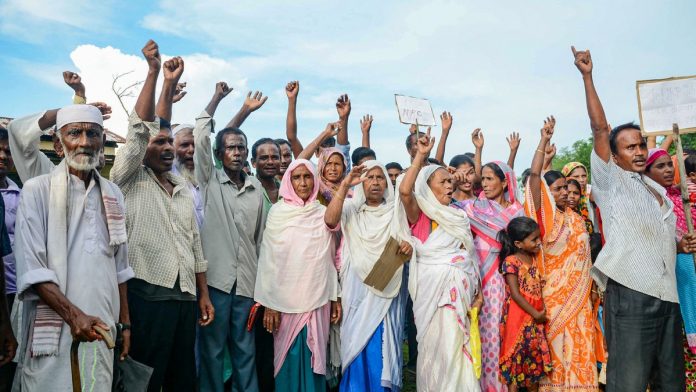
NRC stands for the National Register of Citizens (it is for the record of all the genuine Indian citizens residing in the state of Assam). It is a register of all Indian citizens whose creation is mandated by the 2003 amendment of the Citizenship Act, 1955. The accord, signed between the people of Assam and the Central Government, ordered the locating, cancellation and expulsion of foreign people entering Assam on or after March 25, 1971. It communicated the will of the individuals i.e., the trademark of the Indian democracy. The topographical congruency of Assam with Bangladesh made the State more vulnerable to illegal migration from over the border.
The precarious situations brewing inside the different parts of the nation, counting the national capital can be gauged from different daily paper reports that have shown the dangers, illegal migrants pose to the nation show how important the implementation of NRC has become for the current situation.
In a news item in the Hindustan Times dated April 20, 2018, it was detailed that of the 29 Bangladeshis captured by the ATS for staying illicitly in Maharashtra, three of them were suspected of having associations with a prohibited Islamic extremist organization Ansarullah Bangla Team (ABT) that has been inspired from Al Qaeda.
The Advantages and Significance of National Register of Citizens
An expanded and improved NRC implemented in stages is key to effectively monitor and control illegal immigration; its most important effect being its deterrent value, staving off future illegal immigration and acting as a restraint to the votaries of vote bank politics, says Vivek Gumaste. Critics naming the NRC as an experiment went astray, the normal castigating it as an anti-Muslim witch-hunt, and alarmists stirring fears of human rights infringement has made people question about National Register of Citizens more than before. Does this mean that the NRC could be a fizzled venture as a cure to illegal immigration; a worthless project that ought to never have been attempted and one that ought to presently be disposed of?

Well, the answer is no. Illegal immigration is not merely a state’s problem but a serious issue for the entire nation. It is a spectre that has been haunting us ever since we got Independence.
India’s porous borders with Bangladesh have made it possible for migrants from that country to infiltrate bordering states like West Bengal and Assam. The migration of poor laborers from undivided Bengal to the prolific ranges of Assam can be followed back to the 1800s and was instigated by the British. This stream of workers has proceeded unchecked since then to the present times in spite of the modified geopolitical conditions that saw Assam and Bengal drop on different sides of an international border, effectively making this migration an illegal process. While the precise number of illegal migrants remains unclear, a reasonable assessment suggests that there are anywhere between 10 and 20 million illegal immigrants with Assam and West Bengal being the states most influenced.
Illegal immigration isn’t an illusion or a daydream of right-wing zealots but an evident reality with genuine repercussions for our internal stability and national security and cannot be wished to vanish away. The presence of illegal workers vitiates the work market as well as the law and order circumstance. It moreover causes a drain on the state’s assets and leads to bitterness and distress among local individuals. What is more, invasion results in demographic changes with far-reaching results – religious, social, and political. It is normal that local communities which embrace nuclear family standards in self-interest as well as for the advancement of the nation’s formation, feel sore when they discover in their midst unlawful migrants, with essentially no self-restraint on this account, hoarding full benefits of welfare measures and other forms of social support extended by the state, resulting in redundant and wasteful expenditure.
Over time, they made themselves enabled with free ration cards, fake documents, and some even with Aadhaar. The delay has caused over-consumption of the national assets and burdening the country with housing more people. This eventually prevents the development of the land and that of the natives. Illegal immigrants hamper the authenticity of our nation. They are people who have come from outside India and are a danger to our culture. India is renowned for its secularism in the world. These migrants put that at stake because how can an outsider know the importance of the culture of a place when he or she does not belong there. This state of affairs is distant from conducive to a social concordance and may have disastrous results on the territorial integrity of the nation if permitted unchecked.
Moreover, the plausibility of this section of the population gets to be a breeding ground for terrorists and anti-nationals cannot be ruled out. Numerous extradited migrants will also abdicate an opportunity for significant shrinkage in illegal exercises such as wrongdoing, terrorism, secret activities and continuous alter in employment dynamics. The deporting of distinguished illegal migrants back to the land they came from will conclusively change India from humongous costs it draws on the security of its citizen and anticipating cross-border migration. It is said that around 40 Lakh precluded individuals are dwelling in Assam influencing the day-by-day lives of the local Assamese and disintegrating on the economic opportunities our constitution bestows on the enrolled citizens.
In his speech, Amit Shah committed to national security by tracing unlawful workers and emphasized that NRC is the soul of the Assam Agreement. Humanitarian concerns cannot totally dominate the long-term genuine effect of unlawful movement on internal stability (the stewing discontent in Assam and north-east may bubble over at any time) and national security (statistic changes along the Indo-Bangladesh may be a formula for another Kashmir within the making) which can erode the very foundations of our country and devastate its social texture. At no cost, financial or something else is as well restrictive to secure the sway of our country and guarantee the security of our citizens.
Conclusion
All respective governments of the world can act suitably against the unlawful migrants entering their nations agreeing to the civil law. The gravity of the circumstance cannot be underlined enough. Such mass unlawful movement can pose a genuine danger to internal security as well as burden the existing national assets and cause lasting disturbance within the social continuity of a locale.
Rather than politicizing the issue, all parties need to come together and guarantee that the NRC exercise is conducted gently, not just in Assam but moreover across India. It will give a confirmed dataset to carry out calibrated policy measures. Updated National Register of Citizens is anticipated to deter future migrants from Bangladesh from entering Assam illegally. As each state has constrained assets, an upgraded NRC will guarantee that only the legitimate person/citizen should be getting the benefits. In any case, the peace-loving individuals of Assam would rather like the last resolution on the issue of unlawful migration without any further delay than be quiet witnesses to a diversion of political game over a non-issue.
What is more, the individuals of the North-Eastern states of Manipur, Meghalaya, Nagaland and Arunachal Pradesh have joined the bandwagon and requested the National Register of Citizens in their states as well to check the vexatious issue of unlawful migration. An expanded and improved NRC implemented in stages is the key to successfully monitor and control unlawful movement; it’s most critical impact being its deterrent value, fighting off future unlawful migration and acting as a restriction to the votaries of vote bank politics. The National Register of Citizens must stay, in spite of no quick tangible gains. Its long-term gains are unquestionably substantial.